外研版必修五Module 1 British and American English - Listening and vocabulary课件(31张)
文档属性
| 名称 | 外研版必修五Module 1 British and American English - Listening and vocabulary课件(31张) |

|
|
| 格式 | zip | ||
| 文件大小 | 2.5MB | ||
| 资源类型 | 教案 | ||
| 版本资源 | 外研版 | ||
| 科目 | 英语 | ||
| 更新时间 | 2019-07-16 00:00:00 | ||
图片预览

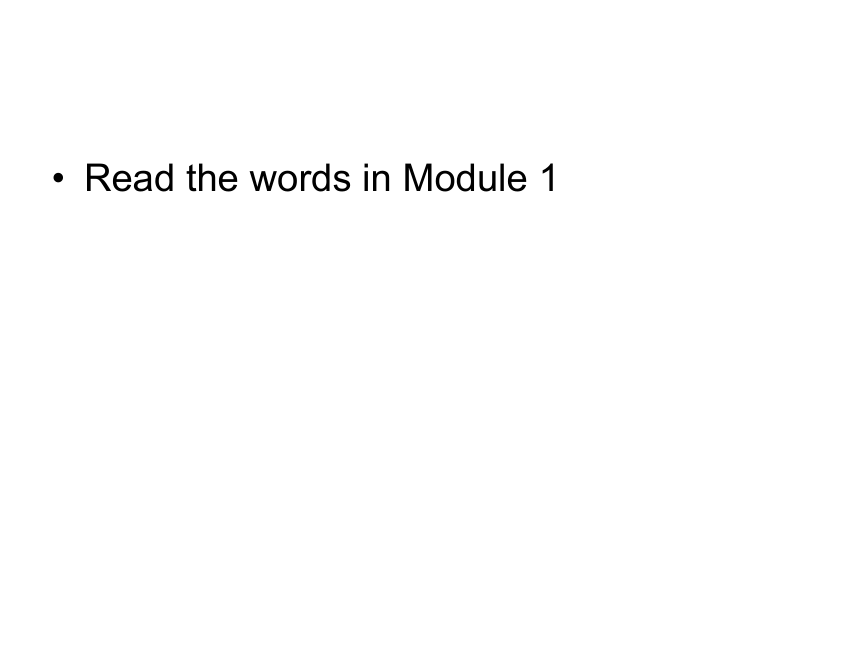
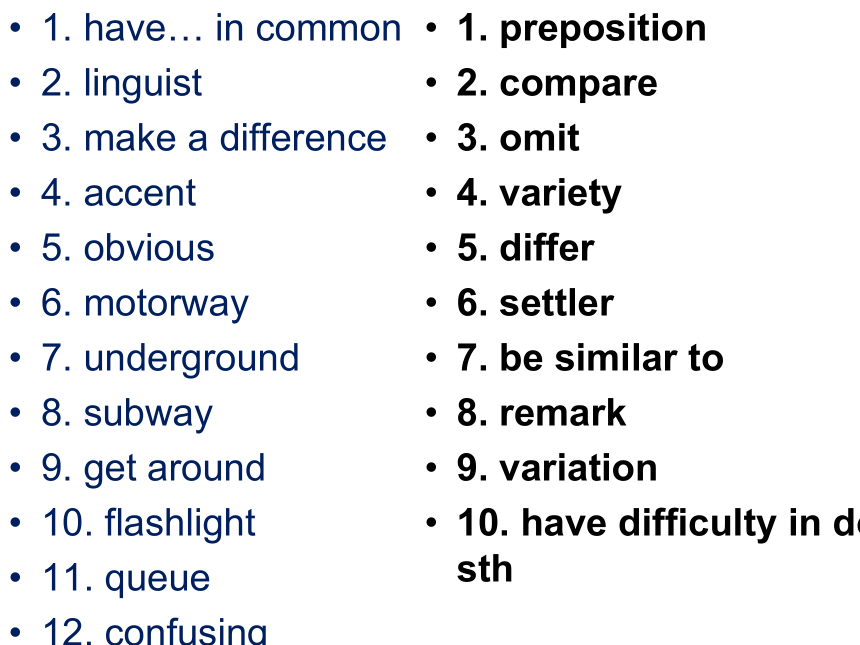
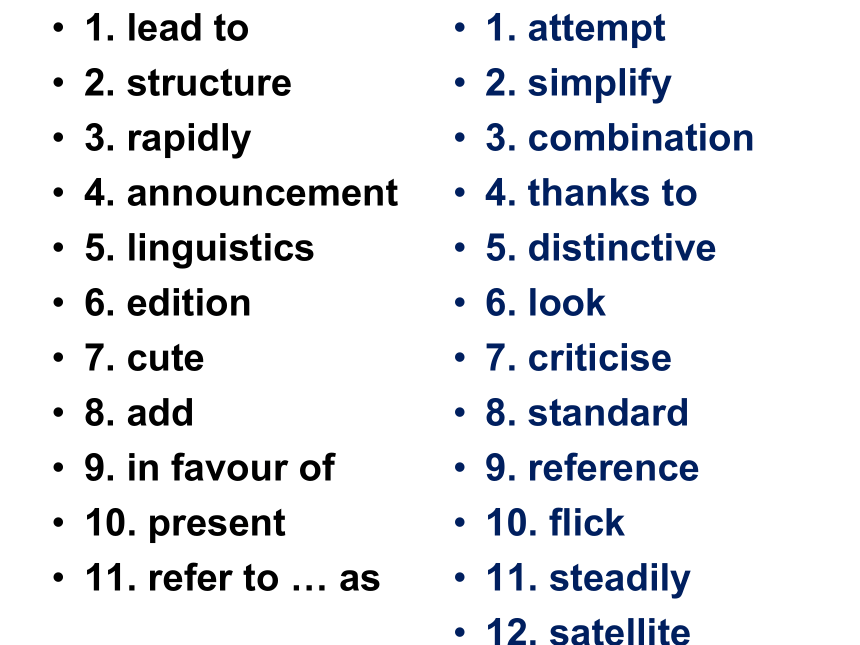

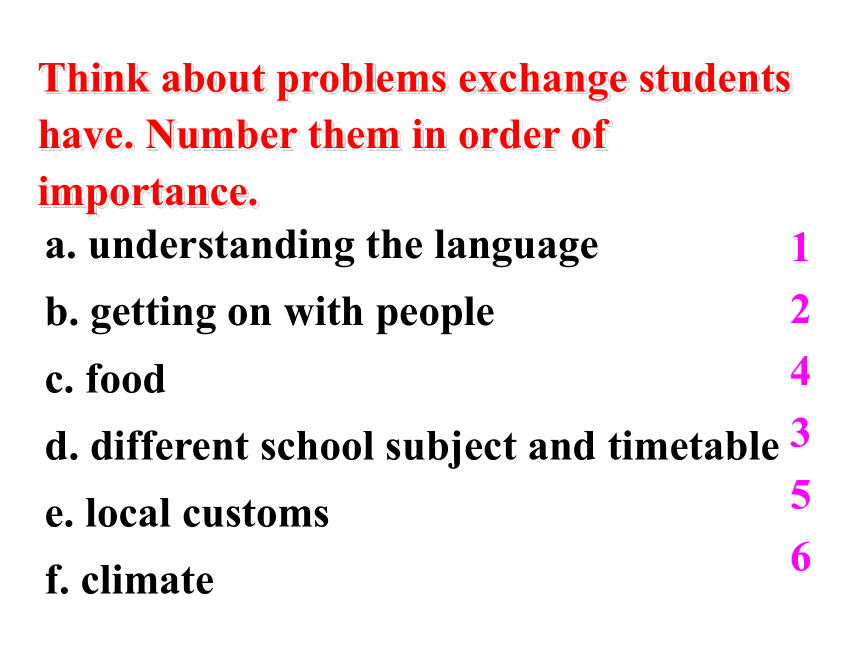

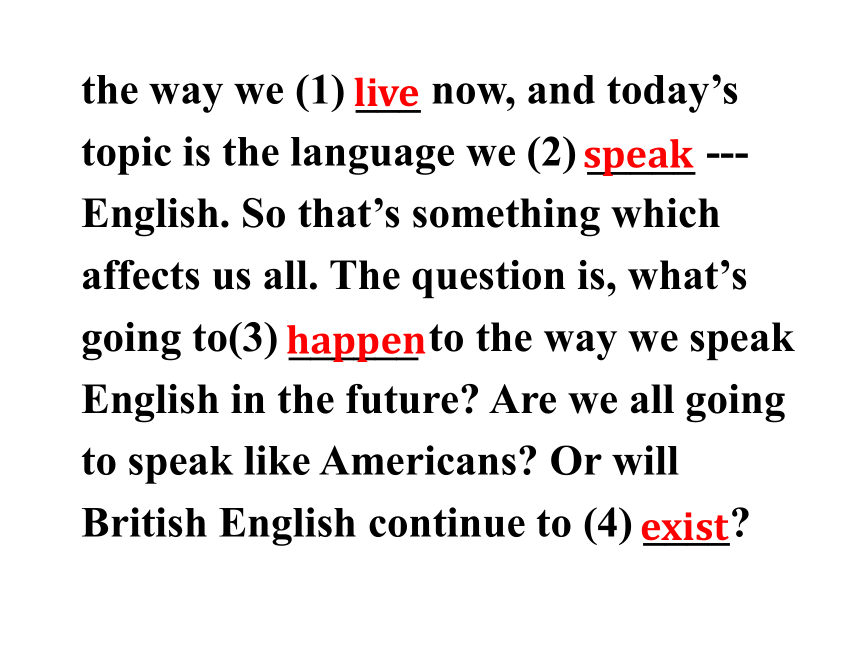
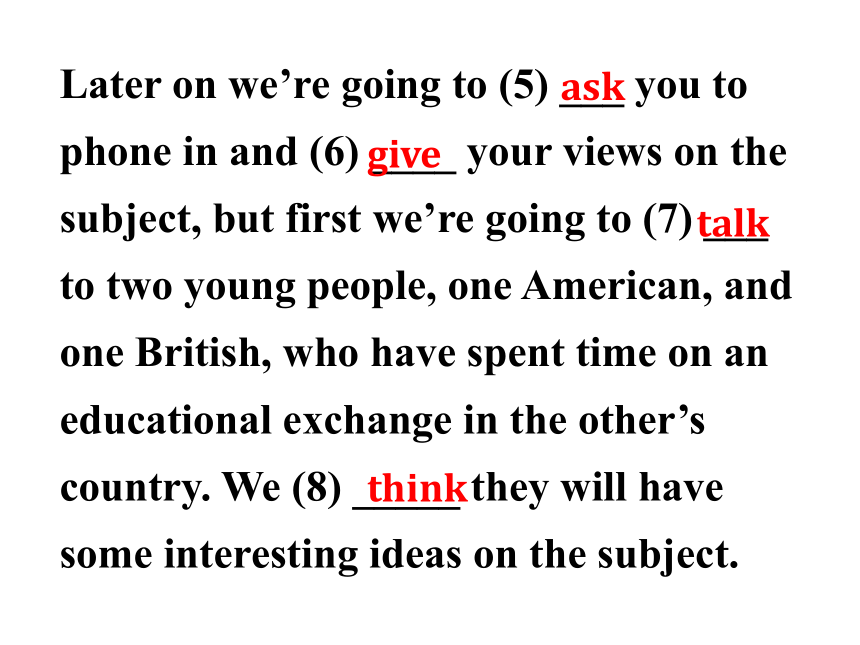
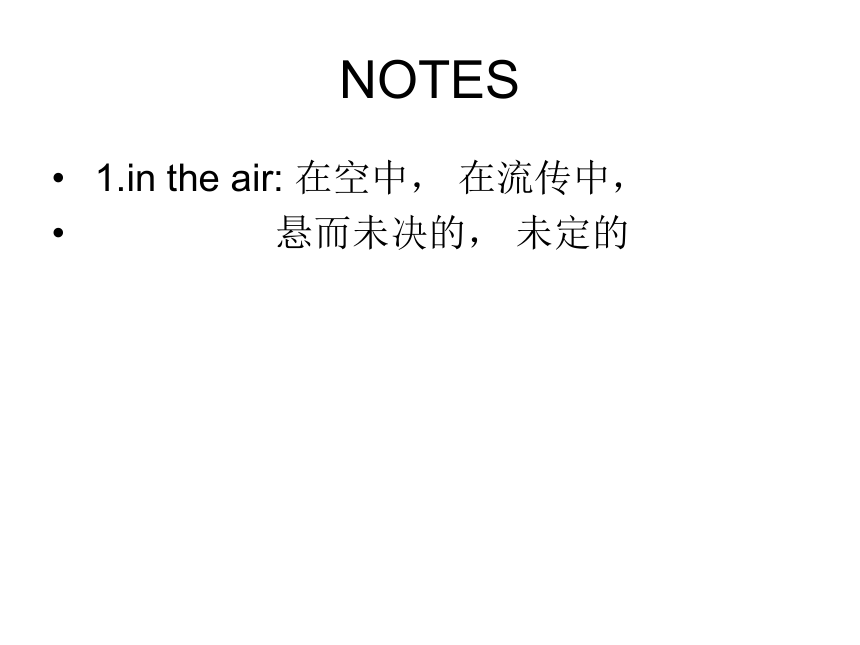
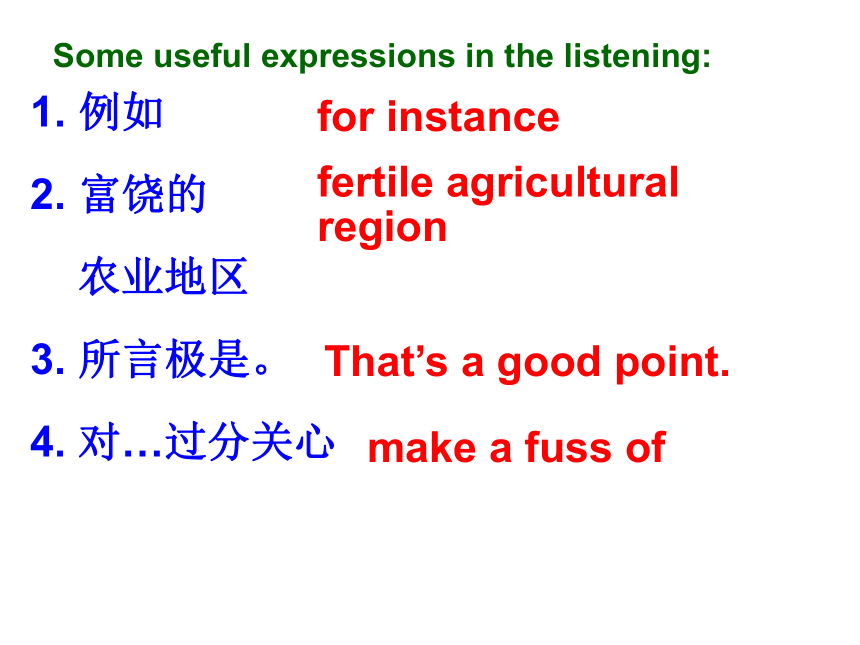
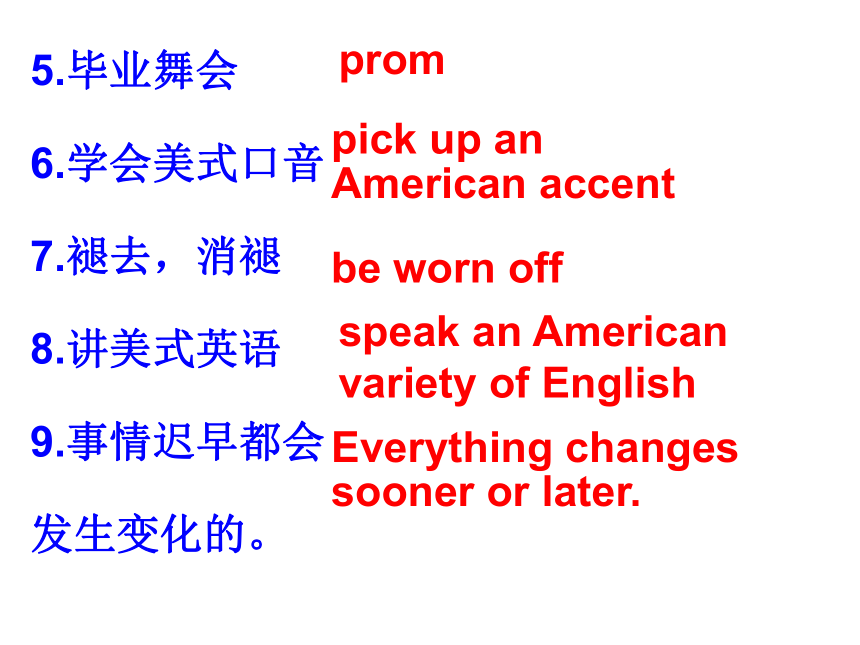
文档简介
课件31张PPT。Module 1
British and American EnglishRead the words in Module 11. have… in common
2. linguist
3. make a difference
4. accent
5. obvious
6. motorway
7. underground
8. subway
9. get around
10. flashlight
11. queue
12. confusing
1. preposition
2. compare
3. omit
4. variety
5. differ
6. settler
7. be similar to
8. remark
9. variation
10. have difficulty in doing sth
1. lead to
2. structure
3. rapidly
4. announcement
5. linguistics
6. edition
7. cute
8. add
9. in favour of
10. present
11. refer to … as 1. attempt
2. simplify
3. combination
4. thanks to
5. distinctive
6. look
7. criticise
8. standard
9. reference
10. flick
11. steadily
12. satellite
exchange studentsThink about problems exchange students have. Number them in order of importance.1
2
4
3
5
6a. understanding the language
b. getting on with people
c. food
d. different school subject and timetable
e. local customs
f. climateComplete the passage with the words in the box.Hello, and welcome to today’s edition of In the air. As you know, every week on this programme we discuss an aspect of ask exist happen give
live speak talk thinkthe way we (1) ___ now, and today’s topic is the language we (2) _____ ---English. So that’s something which affects us all. The question is, what’s going to(3) ______ to the way we speak English in the future? Are we all going to speak like Americans? Or will British English continue to (4) ____? livespeakhappenexistLater on we’re going to (5) ___ you to phone in and (6) ____ your views on the subject, but first we’re going to (7) ___ to two young people, one American, and one British, who have spent time on an educational exchange in the other’s country. We (8) _____ they will have some interesting ideas on the subject. askgivetalkthinkNOTES 1.in the air: 在空中, 在流传中,
悬而未决的, 未定的
Some useful expressions in the listening: 例如
富饶的
农业地区
3. 所言极是。
4. 对…过分关心
for instancefertile agricultural
region
That’s a good point.make a fuss of5.毕业舞会
6.学会美式口音
7.褪去,消褪
8.讲美式英语
9.事情迟早都会
发生变化的。
prompick up an
American accentbe worn offspeak an American
variety of EnglishEverything changes
sooner or later.Everyday English Complete the sentences with the correct phrases.How are you getting on? is a question about___. A. Samantha’s health B. what Samantha is doing2. I didn’t get what people were saying means____. A. I didn’t understand it B. I didn’t like it
3. When Samantha got used to the accent she____. A. began to understand it B. used it when she spoke English4. So far means _____. A. for a long time B. until now
5. That’s a good point means____. A. what you say is interesting B. I agree with you
6. The girls in Callum’s school made a fuss of him by__. A. laughing at him B. showing a lot of interest in him7. A cute accent is ____. A. horrible B. attractive
8. A couple of means ____. A. two B. two or three
9. If Callum picked up the local accent he ____. A. started to use it B. wasn’t able to use it10. If Callum’s American accent has worn off, it has___.
A. disappeared B. become very noticeable1. point
1) 要点; 中心思想
e.g. He missed the whole point of my speech.
他没弄明白我整个演说的要点。
2) 意义;目的;用途un. (+in/of)
e.g. There is no point in complaining.
抱怨没有任何意义。Language points3. pick up
举起或抬起某人[某物]; 拿起; 拾起:
e.g. He picked up the book from the floor.
他从地板上把书拾起来.
(b) 见到, 听到(尤指藉助仪器):
e.g. The equipment picked up the signal
from the satellite.
这设备收到了卫星发出的信号。(c) 通过实践学会(外语、 技术等):
e.g. She soon picked up French when she went to live in France.
她到法国居住后很快就学会了法语。
(d) 得, 染(疾病):
e.g. pick up an infection, a cold, the flu, 2. wear
1) wear off 慢慢消失
e.g. The pain in his back is wearing off.
他背部的疼痛正在慢慢消失。
2) wear out 使疲惫不堪
e.g. He was worn out by the hard work.
繁重的工作使他疲惫不堪。1. I like Leeds because there’s more going on here than back home in the States.
2. Since English is spoken all over the world, there are lots of varieties.
3. As I was the only British person in the
school, they made a fuss of me.
4. I’m getting on just fine, now that I
understand the local accent.Function: Giving reasonsUnderline the words which introduce reason.Which word do we use more often to introduce a reason?
Which expression shows that a situation has changed?
3. Which two words often come at the beginning of a sentence?BecauseNow thatSince and asYou should not despise a man just because he is poorly dressed.
She is not marrying Bill, because he is poor.1) because语势最强, 用来说明人所不知的原因, 回答why提出的问题, 是句子中的重要部分, 常放在句末, 不能用其它三个替换。逗号可加可不加。 You can trust those products because the quality never changes.
I haven’t been to the cinema lately, because I am too busy.because, since, as, for 辨析2) 当原因是显而易见的或已为人们所知, 就用as或 since。since稍正式一些。
Since /As the weather is so bad, we have to delay our journey. 3) 由because引导的从句如果放在句末, 且前面有逗号, 则可以用for来代替。但如果不是说明直接原因, 而是多种情况加以推断, 就只能用for。
He is absent today, because/for he is ill.
He must be ill, for he is absent today. 4) 当because引导的从句与否定的主句连用, 而主句又位于句首时, 之前不用逗号, 因为主句动词否定的是其后的全部内容。为了突出because从句, because前常加上副词, 如: just, only, simply, chiefly等。 Complete the sentences with because, since/as or now that.1. It is useful to learn English ________ it is spoken all over the world.
2. ________ they see lots of American films, the British are used to American accents.because/asSince/As3. Americans like the British accent _______ they think it is cute.
4. It’s easier to compare British and American English ________ we have the Internet.becausenow thatHomework
British and American EnglishRead the words in Module 11. have… in common
2. linguist
3. make a difference
4. accent
5. obvious
6. motorway
7. underground
8. subway
9. get around
10. flashlight
11. queue
12. confusing
1. preposition
2. compare
3. omit
4. variety
5. differ
6. settler
7. be similar to
8. remark
9. variation
10. have difficulty in doing sth
1. lead to
2. structure
3. rapidly
4. announcement
5. linguistics
6. edition
7. cute
8. add
9. in favour of
10. present
11. refer to … as 1. attempt
2. simplify
3. combination
4. thanks to
5. distinctive
6. look
7. criticise
8. standard
9. reference
10. flick
11. steadily
12. satellite
exchange studentsThink about problems exchange students have. Number them in order of importance.1
2
4
3
5
6a. understanding the language
b. getting on with people
c. food
d. different school subject and timetable
e. local customs
f. climateComplete the passage with the words in the box.Hello, and welcome to today’s edition of In the air. As you know, every week on this programme we discuss an aspect of ask exist happen give
live speak talk thinkthe way we (1) ___ now, and today’s topic is the language we (2) _____ ---English. So that’s something which affects us all. The question is, what’s going to(3) ______ to the way we speak English in the future? Are we all going to speak like Americans? Or will British English continue to (4) ____? livespeakhappenexistLater on we’re going to (5) ___ you to phone in and (6) ____ your views on the subject, but first we’re going to (7) ___ to two young people, one American, and one British, who have spent time on an educational exchange in the other’s country. We (8) _____ they will have some interesting ideas on the subject. askgivetalkthinkNOTES 1.in the air: 在空中, 在流传中,
悬而未决的, 未定的
Some useful expressions in the listening: 例如
富饶的
农业地区
3. 所言极是。
4. 对…过分关心
for instancefertile agricultural
region
That’s a good point.make a fuss of5.毕业舞会
6.学会美式口音
7.褪去,消褪
8.讲美式英语
9.事情迟早都会
发生变化的。
prompick up an
American accentbe worn offspeak an American
variety of EnglishEverything changes
sooner or later.Everyday English Complete the sentences with the correct phrases.How are you getting on? is a question about___. A. Samantha’s health B. what Samantha is doing2. I didn’t get what people were saying means____. A. I didn’t understand it B. I didn’t like it
3. When Samantha got used to the accent she____. A. began to understand it B. used it when she spoke English4. So far means _____. A. for a long time B. until now
5. That’s a good point means____. A. what you say is interesting B. I agree with you
6. The girls in Callum’s school made a fuss of him by__. A. laughing at him B. showing a lot of interest in him7. A cute accent is ____. A. horrible B. attractive
8. A couple of means ____. A. two B. two or three
9. If Callum picked up the local accent he ____. A. started to use it B. wasn’t able to use it10. If Callum’s American accent has worn off, it has___.
A. disappeared B. become very noticeable1. point
1) 要点; 中心思想
e.g. He missed the whole point of my speech.
他没弄明白我整个演说的要点。
2) 意义;目的;用途un. (+in/of)
e.g. There is no point in complaining.
抱怨没有任何意义。Language points3. pick up
举起或抬起某人[某物]; 拿起; 拾起:
e.g. He picked up the book from the floor.
他从地板上把书拾起来.
(b) 见到, 听到(尤指藉助仪器):
e.g. The equipment picked up the signal
from the satellite.
这设备收到了卫星发出的信号。(c) 通过实践学会(外语、 技术等):
e.g. She soon picked up French when she went to live in France.
她到法国居住后很快就学会了法语。
(d) 得, 染(疾病):
e.g. pick up an infection, a cold, the flu, 2. wear
1) wear off 慢慢消失
e.g. The pain in his back is wearing off.
他背部的疼痛正在慢慢消失。
2) wear out 使疲惫不堪
e.g. He was worn out by the hard work.
繁重的工作使他疲惫不堪。1. I like Leeds because there’s more going on here than back home in the States.
2. Since English is spoken all over the world, there are lots of varieties.
3. As I was the only British person in the
school, they made a fuss of me.
4. I’m getting on just fine, now that I
understand the local accent.Function: Giving reasonsUnderline the words which introduce reason.Which word do we use more often to introduce a reason?
Which expression shows that a situation has changed?
3. Which two words often come at the beginning of a sentence?BecauseNow thatSince and asYou should not despise a man just because he is poorly dressed.
She is not marrying Bill, because he is poor.1) because语势最强, 用来说明人所不知的原因, 回答why提出的问题, 是句子中的重要部分, 常放在句末, 不能用其它三个替换。逗号可加可不加。 You can trust those products because the quality never changes.
I haven’t been to the cinema lately, because I am too busy.because, since, as, for 辨析2) 当原因是显而易见的或已为人们所知, 就用as或 since。since稍正式一些。
Since /As the weather is so bad, we have to delay our journey. 3) 由because引导的从句如果放在句末, 且前面有逗号, 则可以用for来代替。但如果不是说明直接原因, 而是多种情况加以推断, 就只能用for。
He is absent today, because/for he is ill.
He must be ill, for he is absent today. 4) 当because引导的从句与否定的主句连用, 而主句又位于句首时, 之前不用逗号, 因为主句动词否定的是其后的全部内容。为了突出because从句, because前常加上副词, 如: just, only, simply, chiefly等。 Complete the sentences with because, since/as or now that.1. It is useful to learn English ________ it is spoken all over the world.
2. ________ they see lots of American films, the British are used to American accents.because/asSince/As3. Americans like the British accent _______ they think it is cute.
4. It’s easier to compare British and American English ________ we have the Internet.becausenow thatHomework
